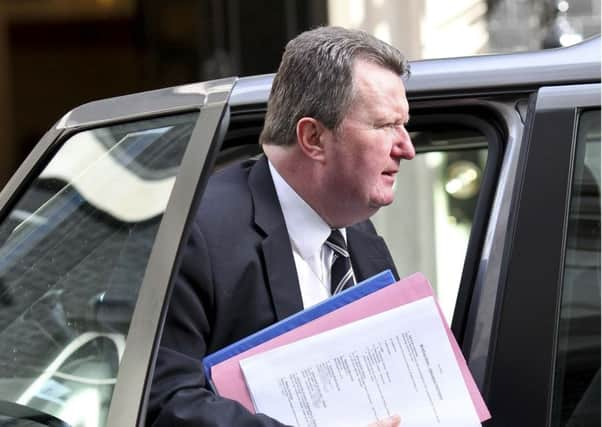Martyn McLaughlin: Government pushing the envelope on Brexit bungling


It seems only fitting that the UK Government’s calamitous post Brexit planning should be exposed by the lack of an envelope. Until yesterday, that is what we assumed it was being scribbled on.
The situation, it transpires, is graver than first thought. There is no envelope after all, only an A4 sheaf of spidery handwriting which, from a distance, looks like Sir Humphrey’s letter to Santa (“We’ve been very well behaved and, to be honest, it’s been a bit of a rough year, so could we please have a free trade deal”).
Advertisement
Hide AdAdvertisement
Hide AdThe document in question belonged to Julia Dockerill, chief of staff to Mark Field, the Conservative MP. She was photographed carrying it as she emerged from a meeting at the Brexit department at 9 Downing Street.
It has been excitedly described in some quarters as a secret memo, tabloidese for what is conventionally refered to as a ‘note’. However it is characterised, the longhand still provides an intriguing insight into the thinking, or lack of it, as Britain seeks to disentangle itself from the European Union.
The government has moved to distance itself from the document, emphasising that it was not drawn up by a government official or a special adviser. Yet the positions outlined by Ms Dockerill, specifically the reference to the “have your cake and eat it” model, is indicative of the hard Brexit approach favoured by some within the department and other areas of the government.
There is speculation that Ms Dockerill’s attention lapse may not have been entirely accidental. Mr Field, a vice-chairman of the Conservative Party, was a staunch remain supporter and before the referendum, he called on every minister campaigning for the opposite side to resign.
If we are to discount that possibility and put the gaffe down to coincidence, it still shows a remarkably cavalier attitude to the handling of confidential political papers.
It is a problem that has become increasingly widespread, to the extent that it was seized upon by Armando Iannuci’s scathing satire, The Thick of It. In one episode, an aide to Nicola Murray, Rebecca Front’s hapless minister for social affairs and citizenship, is pictured with a summary of plans to recognise the country’s everyday heroes, a demographic referred to as “quiet bat people.”
Save for a careless proverb, Ms Dockerill’s notes revealed nothing quite so damaging, at least compared to previous incidents when ministers, MPs and advisors have been undone by enterprising photographers. At best, these slips of judgment are embarrassing, but on occasion they are capable of sparking a full blown crisis.
Two years ago, Hugh Powell, the deputy national security adviser, was photographed with a document which revealed the government would not support sanctions or Nato military efforts against Russia, a stance which contradicted the tough talking in public against Vladimir Putin’s incursions in Crimea.
Advertisement
Hide AdAdvertisement
Hide AdA year before that, a Downing Street adviser invited ridicule towards an already beleaguered coalition government after he was pictured with a document making reference to an “audit of coalition broken promises”.
The most damning incident came in 2009 when Bob Quick, the country’s most senior counter terrorism officer, was caught with a briefing paper which described in intimate detail an imminent operation to bring down an alleged al-Qaeda cell. A news blackout swiftly followed as Scotland Yard was forced to accelerate its plans. True to his name, Mr Quick left his post soon afterwards.
This spate of incidents even led Downing Street officials to adopt a particularly British solution - installing a notice in a foyer inside No 10, advising visitors that “Downing Street is a public highway” frequented round the clock by members of the fourth estate.
Such passive aggressive advisories have clearly not been heeded, nor, ironically, have the warnings from the photographers themselves.
Steve Back, a stalwart of the Downing Street press scrum who captured the images of Ms Dockerill’s notes, pointed out nearly a decade ago that the government was leaving itself exposed.
“They know that there is a photographer outside No 10 and yet they just don’t cover them up,” he explained. “I must have spoken to the Downing Street press office a dozen times to say, ‘For God’s sake tell them to cover up their documents.’”
As a magistrate in west London when he is not behind the lens, Mr Back’s concern for upholding order may be genuine, but the fact he has been ignored so often has helped turn his freelance engagements into a profitable enterprise.
He estimates that he will catch sight of private notes at least once a month, a hit rate that has increased of late thanks to advances in digital camera technology. Along with Ms Dockerill and Mr Quick, his scalps include Lord Mandelson and Caroline Flint.
Advertisement
Hide AdAdvertisement
Hide AdIt is only a matter of time before the next careless politico falls victim. The threat is easily solved. A bulk box of 50 A4 Manila envelopes are currently on offer at Staples for £5.80, inclusive of VAT. Even in these straitened times, that strikes me as a prudent insurance policy against carelessness.
The only question is how many boxes are required to cover the meetings and briefings that will take us up to the triggering of Article 50. What do you think, best round it up to a couple of hundred?